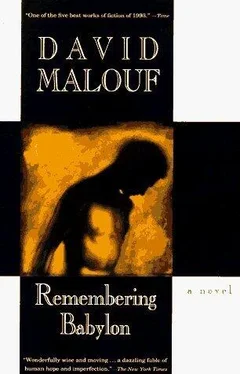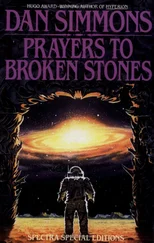Young enough to learn and to be shaped as if for the first time, he was young enough also to forget. He lost his old language in the new one that came to his lips. He had never in fact possessed more than the few hundred words that were immediately needful to him, to fill his belly or save his skin, having heard little in his short life but commands, curses, coarse endearments, the street talk he had learned to spit out like the rest, and such bits and pieces of something lighter — jokes, riddles, the words of a penny-gaff tune — that he had picked up from Willett, or at the beer shop while he was waiting on one foot for their ale to be drawn, and in his years at sea from the talk of sailors bent over a bit of darning in the swing of the fo’c’sle lamp or sprawling on deck. It was not enough to hold him.
As for things, nothing he had dealt with had been his own. He had stammered over most of them, b-b-boots, j-j-jug; his hold was buttery. Now they slipped away altogether, they dropped out of his life, and with them, and the words, went whatever thin threads had held them together and made up the fabric of his world.
Occasionally some object out of his old life would come floating back and bump against him. He would see it clearly enough, feel his hand clasping the handle of the jug or smell the dark-stained leather, but no word was connected to them, and when his mind reached for it, the object too went thin on him. He felt a kind of sadness that was like hunger, but of the heart, not the belly, and could only believe, since these things came to him only in fragments, that they belonged to the life of some other creature whose memory he shared, and which rose up at moments to shake him, then let him go.
In time his coming among them became another tale they told and he would listen to it with a kind of wonder, as if what they were recounting had happened ages ago, in a time beyond all memory, and to someone else. How, when they found him he had still been half-child, half-seacalf, his hair swarming with spirits in the shape of tiny phosphorescent crabs, his mouth stopped with coral; how, ash-pale and ghostly in his little white shirt, that long ago had rotted like a caul, he had risen up in the firelight and danced, and changed before their eyes from a sea-creature into a skinny human child.
He would listen, and in one part of himself, the part that belonged to their tribal life, he believed, but in some other part he did not. There was a different story, he thought, which was his alone and secret: which had another shape, and might need, for its telling, the words he had had in his mouth when they first found him, and had lost; though not, he thought, for ever.
He was accepted by the tribe but guardedly; in the droll, half-apprehensive way that was proper to an in-between creature.
No woman, for example, would have to do with him, and there were many objects in the camp that he was forbidden to touch. Their life was a cat’s cradle of rights and restrictions; they all had objects, people too, that they must not look upon; but the restrictions on him were his alone, and the separation he felt, his questionable status, kept alive in him what he might otherwise have let go. When he stretched out in his place by the camp fire and his eyes and hands had nothing to engage them, the images that came, even if he could not grasp them, were as real as the fat in his mouth, or the familiar, distinctive odour of those who were stretched beside him.
‘Boots’ the darkness whispered — he caught only the breath of the word — and there they were: objects that made no sense here, that he saw propped up in front of a barred grate with flame in every crack of their leather, the tongues loose, the laces trailing, and the voice in the dark, very hoarse but not fierce, was Willett’s, and there he was too, rising up out of them with his eyebrows blazing. Willett!
The others had their own explanation for these midnight hauntings. He was a tormented spirit. The cries he uttered in his sleep, the terrors that assailed him, were proof that although he had the look of a man, he was not one, not yet. A day would come when, fully arrived among them, he would let go of the other world.
His view was different. One day, he thought, I will turn around on some track deep in the scrub and he will be there, making fast towards me, not ghostly, in no way ghostly, and I will wait there for him to catch up, open a place for him to step into, and we will go on. He did not ask himself where.
In the meantime he was here, though where here was, and why he was in this place rather than another, was a mystery to him.
He approached this mystery at times, just touched it, and was uneasy. Mostly he let it alone. When the time comes, he told himself, it will approach me.
So when news drifted up from the south of spirits, white-faced, covered from head to foot in bark and riding four-footed beasts that were taller than a man, he was disturbed, and the desire to see these creatures, to discover what they were, plucked at him till he could not rest. In the company of an old woman who knew the country because she had grown up there, he set out to find them, but when they came to a part of it that she did not know, the woman turned back. He went on alone. Long before Lachlan Beattie and the two girls found him he had been skirting the edge of the settlement, living off the strange yet familiar country down there, and keeping watch from the cover of the scrub.
His first discovery was tracks of a kind that utterly puzzled him, then, in the middle of the path, a line of droppings, big, round, golden-dark with a sheen to them, about the size of a buzzard’s egg, unlike the pellets of local creatures. Touched with a fearful curiosity, he got down on all fours and sniffed. A kind of clattering filled his head, and he glanced up, expecting to find himself in the narrow and noisy confines of — of what? What had he almost seen? It was gone again. Was that what he would find on the other side of the scrub?
He worried over the image, trying to catch again some detail that would make a picture, but it had been just a flash, mostly noise and a sense of panic in him. And all around, so clear that it filled all the spaces in him, was the familiar busyness of the scrub, a low, continuous rub and fret broken by bird calls, each of which brought a clear little body to his mind, flutterings, scurryings, the skirl of insects.
The next sign he came to was a red blanket thrown over a line. His heart leapt. But when he crept forward and whipped it aside there was only a blaze of grass heads, the bulk of a wooden hut, and standing in front of it, a little round-bellied naked child, rather unsteady on her white legs, and staring. She stood like that for a moment, puzzled, absorbed, then raised her fists to her eyes and howled.
Later, from another part of the scrub, he looked into a clearing, all raw timber and scattered leaves, and saw a bearded fellow in a blue shirt and braces who spat on his hands, took up a long-handled, bladed instrument, and stood preparing to swing it. He was amazed. A kind of meaning clung to the image in the same way that the clothes he was wearing clung to the man, and when the blade flashed and jarred against wood, it struck home in him. Axe .
The word flew into his head as fast and clear as the flash and whistle of its breath. Axe. Axe . Circles of meaning rippled away from the mark it blazed in the dark of his skull.
Further on a woman emerged from a hut carrying a basket on her hip. She set it down and began pegging clothes on a line, shirts, then trousers, then children’s things and a frock. He fingered the rough material of the rag he had kept from the raft — which he wore knotted at his waist, as a sign should he be caught — and had to sit in the tall grass hugging himself, such a rush of bewilderment and soft affection came over him.
Читать дальше












